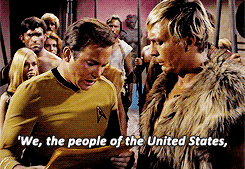Either Picard is the incarnation of arrogance and perfidy or ...
Picard was just as susceptible to imperfections as Kirk was.
Both are true, Picard was imperfect and I don't think anyone is under the false impression that he was perfect. His failing was his perspective that he and his society were perfect. That his was a utopian paradise and that unless you embraced (or had already obtain) his type of society he was better than you.
This is where you find the near universal observation that Picard was arrogance incarnate.
Kirk on the other hand was well aware that he was imperfect, and while he believed in his society, he didn't look down on people whose societies were different.
Now did the arrogance result in a loss of rating? Hard to say, but it was tiresome. It would have been (imho) an interesting improvement in Picard's character if he had gradually lost his hubris over the course of the series.
The prime directive is not heartless ...
That depends on the application, not simple on the existence of the directive.
I think the issue people have with the prime directive is the same thing that people don't understand about our environment
I would think that there would be absolutely no similarities in the slightest.
and it's up to us to control our environment.
It's up to us to control our surroundings to our best benefit.

For the love of Chrysler some of y'all need a hobby.






 Fighting among Treeb sects and Largoths... ah, the foolishness.
Fighting among Treeb sects and Largoths... ah, the foolishness.